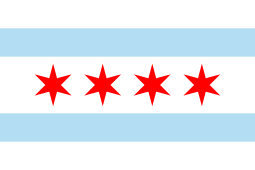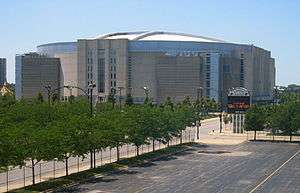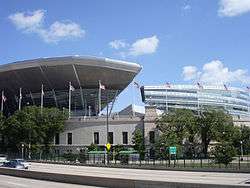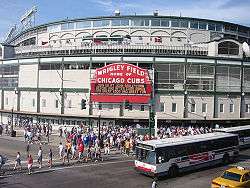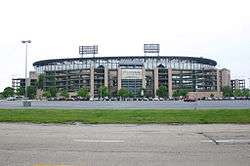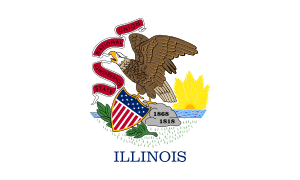Chicago Fire Soccer Club
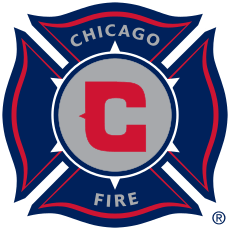 | |||
| Full name | Chicago Fire Soccer Club | ||
|---|---|---|---|
| Nickname(s) |
| ||
| Founded | October 8, 1997 | ||
| Stadium |
Toyota Park Bridgeview, Illinois | ||
| Capacity | 20,000 | ||
| Chairman |
Andrew Hauptman (majority) Joe Mansueto (minority) | ||
| Head coach | Veljko Paunović | ||
| League | Major League Soccer | ||
| 2017 |
Eastern Conference: 3rd Overall: 3rd Playoffs: Knockout round | ||
| Website | Club website | ||
|
| |||
Chicago Fire Soccer Club is an American professional soccer club based in the suburb of Bridgeview, Illinois. The team competes in Major League Soccer (MLS) as a member of the league's Eastern Conference, having moved to the conference in 2002.
The franchise is named after the Great Chicago Fire of 1871, and was founded on October 8, 1997, the event's 126th anniversary. The team began play in 1998 as one of the league's first expansion teams. The Fire won the MLS Cup as well as the U.S. Open Cup (the "double") on their first season. They also won U.S. Open Cups in 2000, 2003, and 2006, in addition to the 2003 MLS Supporters' Shield. In 2015, the club won the first ever MLS Wooden Spoon, and repeated the feat in 2016.
The Fire maintains an extensive development system, consisting of the Chicago Fire Development Academy and the Chicago Fire Juniors youth organization. They also operate the Chicago Fire Foundation, the team's community-based charitable division. Toyota Park is the Fire's home stadium.
History
Overview
Founded on October 8, 1997,[1] the Fire were originally based at Soldier Field. Since 2006, the club plays at their own stadium, Toyota Park at 71st and Harlem Avenue in Bridgeview. The owners of the Fire are Andell Holdings, who purchased the club in 2007. Andell Holdings chairman Andrew Hauptman acts as club chairman, while the general manager is Nelson Rodriguez and the chief operating officer is Atul Khosla. The Fire are historically most successful in the U.S. Open Cup; winning championships in 1998, 2000, 2003, and 2006. The Fire keep a close connection with the Chicago Sting, its predecessor team in the NASL, by holding frequent commemorative events and reunions, and wearing Sting-inspired shirts.
Many notable players have worn the Fire shirt, including U.S. internationals Chris Armas, Carlos Bocanegra, Frank Klopas, DaMarcus Beasley, Brian McBride, Tony Sanneh, Cory Gibbs, Ante Razov, Josh Wolff and Eric Wynalda. Some of the club's other notable American professional players include C.J. Brown, Jesse Marsch, Chris Rolfe, and Zach Thornton. The Fire also have a reputation for importing international talent, from established veterans like Bastian Schweinsteiger, Pável Pardo, Piotr Nowak, Cuauhtémoc Blanco, Tomasz Frankowski, Lubos Kubik and Hristo Stoichkov; in addition to younger players such as Patrick Nyarko, Marco Pappa, Damani Ralph, Bakary Soumaré and Nery Castillo.
The Chicago Fire are named after the Great Chicago Fire that happened in 1871.
Foundation and initial success (1997–2000)
.jpg)
Founded in 1997 at Navy Pier, on the anniversary of the Great Fire, the Fire immediately tapped into the diverse ethnic makeup of the city. The team brought in Polish players Piotr Nowak, Jerzy Podbrozny, and Roman Kosecki; the Mexican Jorge Campos; and the Czech Lubos Kubik. While all showed their talent while playing for Chicago that first year, American players (Zach Thornton, Chris Armas, C.J. Brown) proved most integral to the Fire's continued success. Under the club's first head coach, Bob Bradley—and against all expectation—the team completed the double in its first competitive year, beating D.C. United in the 1998 MLS Cup Final, and defeating the Columbus Crew in Chicago to win the 1998 U.S. Open Cup a week later.
The team's momentum continued, reaching the 2000 MLS Cup final (losing to Kansas City) and winning the 2000 U.S. Open Cup. Internationally experienced players such as Hristo Stoitchkov joined the Fire, while young American talents such as DaMarcus Beasley developed. The Fire quickly became cemented as one of the league's preeminent teams.
Nomadic times (2002–2004)
With Soldier Field undergoing massive renovations, the Fire moved to the western Chicago suburb of Naperville, Illinois in 2002. That same year, Bob Bradley abruptly departed the team to lead the MetroStars, from his home state of New Jersey. The Fire then selected the U.S. men's national team's top assistant, Dave Sarachan, to assume the vacant post.
Chicago qualified for the league final while also capturing the Supporters' Shield and 2003 U.S. Open Cup along the way. The team returned to Chicago and the renovated Soldier Field midway through the 2003 season.
After that season, longtime captain Piotr Nowak retired to take a position in the front office. He departed a year later to become manager of D.C. United. In this period new talent emerged, including Jamaican striker Damani Ralph. Still, stagnating performances and the building strength of the Eastern Conference made Chicago's league position ever more tenuous. In 2004, the team missed the league playoffs for the first time in their history.
Turmoil, and a permanent home (2005–2007)
The 2005 season began with the unexpected dismissal of popular club president Peter Wilt by then-owners AEG, a move decried by fans, many players, and club staff.[2] This came as a shock, given his brokering of a $100m deal to build the Fire a stadium in the collar suburb of Bridgeview. He was immediately replaced by MetroStars executive John Guppy.
Competitively, the season was most notable for the blockbuster visit of Milan from Italy's Serie A, and the surprising 4–0 away defeat of D.C. United in the Eastern Conference Semi-finals.
2006 arrived, and the Fire moved from Soldier Field into its new stadium in Bridgeview, a southwest suburb of Chicago: Toyota Park, located at the corner of 71st Street and Harlem Avenue. In its first season, it played host to an unspectacular league campaign; but victory in the 2006 U.S. Open Cup marked a continuation of the club's successes and promise for the future.
The anxiety to win another league title continued to grow, however. Sarachan entered 2007 (his fifth season in charge) under intense pressure from fans and the administration to produce a league championship. Tension mounted further on April 3, 2007, when the Fire signed Mexico and América star Cuauhtémoc Blanco to a Designated Player contract. After a perfect three matches to open the year, they won only one of their next eight, and Sarachan was dismissed. Following a brief search, Millonarios manager Juan Carlos Osorio was named the club's third head coach.
New ownership (2007–2009)
More change came soon afterward. On September 6, 2007, Andell Holdings, a Los Angeles-based private investment firm controlled by chairman Andrew Hauptman, acquired AEG's interest in the Chicago Fire Soccer Club. Reports estimated the purchase price to be upwards of $35 million.[3] The team has not won a major trophy since Hauptman bought the team.
On the field, behind Blanco and Wilman Conde, Osorio's central defender at Millionarios, the Fire went on an extended unbeaten run to close the season, easily qualifying for the playoffs but were defeated at New England in the Eastern Conference Final. On December 10, 2007, the Fire announced Osorio's resignation. He was named manager of the New York Red Bulls eight days later. Hauptman filed tampering charges with the league in protest, and the Fire were compensated by the Red Bulls with cash and draft picks.[4]
Changes came quickly in Osorio's wake. On January 17, 2008, former Fire star Frank Klopas was named Technical Director in charge of player personnel, and longtime Fire assistant Denis Hamlett was appointed manager. While the Fire struggled at home in 2008 the team found unusual success on the road, gathering 22 out of a possible 45 away points. Momentum grew with the long-anticipated signing of Chicago native Brian McBride on a free transfer in July 2008. After disposing of the Red Bulls 5–2 in the season's final game, they decisively conquered New England in the first round of the playoffs with a 3–0 victory at home. This was Chicago's first playoff advancement over the Revolution in four consecutive seasons. But triumph only lasted for a week, as they again missed the league final with their 2–1 Eastern Conference Final loss to eventual champion Columbus.
The 2009 season saw few alterations to the previous year's roster. The story of the season was much the same, as continued poor home form offset excellent performances away from Toyota Park. This led to a second place Eastern Conference finish behind Columbus. Despite this, Real Salt Lake managed to upset the Crew in the quarterfinals, meaning Chicago would host the semi-final for the first time in six years. Chicago's nearly flawless home playoff history meant little in the end, as they lost to Salt Lake, 5–3, on penalties after 120 scoreless minutes. Shortly thereafter, manager Denis Hamlett was dismissed.[5]
A team in flux (2010–2012)
Leading up to 2010, Chicago hired Carlos de los Cobos as head coach, previously manager of El Salvador.[6] Cuauhtémoc Blanco, Chris Rolfe and Gonzalo Segares all departed. More changes came in the summer transfer window with the trade of Justin Mapp to Philadelphia, the acquisition of Mexican international striker Nery Castillo, and the trade for former Swedish international midfielder Fredrik Ljungberg. Defender Gonzalo Segares returned to the Fire, leaving Apollon Limassol after only six months away. Despite these reinforcements, the Fire failed to qualify for the playoffs for only the second time in club history. Former U.S. international Brian McBride and club original C.J. Brown retired at season's end, followed closely by the departures of Wilman Conde, Ljungberg, and Castillo.
2011 began much in the way of 2010, with foundering performances both home and away. After nine winless matches, Carlos de los Cobos was let go on May 30, 2011.[7] Technical Director Frank Klopas was named interim head coach. Behind summer reinforcements Pável Pardo and Sebastián Grazzini, as well as forward Dominic Oduro's 12 goals after being acquired in a trade from Houston and Dan Gargan's defensive addition, the Fire qualified for the U.S. Open Cup Final (lost at Seattle) and narrowly missed making the playoffs after gaining 24 points in their last 12 league matches. After the season's conclusion, Klopas was given the permanent manager job on November 3, 2011.[8]
Although expectations were modest for 2012, Klopas' first full season as coach, the year saw a change in fortune for the Fire. The spring and summer months saw several new acquisitions for the club, starting with the reacquiring of Chris Rolfe from Aalborg BK.[9] Rolfe, who scored eight goals and 12 assists in the 21 games he played in 2012, would later be named the Fire's MVP.[10] Other signings included Brazilian midfielders Alex Monteiro de Lima from the Swiss side FC Wohlen, Alvaro Fernandez from Seattle Sounders FC, forward Sherjill MacDonald from Beerschot AC of Belgium and veteran defender Arne Friedrich from VfL Wolfsburg. Although they would fall out of the U.S. Open tournament early that season, the Fire eventually compiled a 17–11–6 record, their best since 2000, and ranked as high as second in the Eastern Conference before ending the year in fourth place.[11] On October 31, 2012, in their first playoff appearance since 2009, the Fire lost their first-round MLS Cup playoff match-up at home against the Houston Dynamo, 2–1.[12]
Missing the playoffs
In the 2012–2013 offseason, the franchise made some moves to improve on 2012's success. The team acquired Joel Lindpere and Jeff Larentowicz and also traded Dominic Oduro for Dilly Duka and the rights to Robbie Rogers.[13] The beginning of the season saw the team struggling to score goals, resulting in a record of 2–5–1 through April. After two successive losses to the Union in May, and with veteran Arne Friedrich still on injured reserve, the Fire acquired their former centerback Bakary Soumaré from Philadelphia.[14] Also in May, Robbie Rogers expressed an interest to play in Southern California, at which point a deal was brokered for Rogers' rights in exchange for Chicago native Mike Magee from the Los Angeles Galaxy.[15] On June 23, 2013, Friedrich, who had not played a 2012–13 game due to recurring injuries, announced his retirement.[16] After starting the season 2–7–3, the additions of Soumare and Magee led to seven wins in the squad's last 10 games. The Fire were busy in the transfer window as well, adding veteran defensive midfielder Arévalo Ríos and forward Juan Luis Anangonó.[17] The Chicago Fire also advanced to host the semifinal of the 2013 Lamar Hunt U.S. Open Cup, but fell 2–0 to eventual champions D.C. United. Alleged fan actions in the stadium that night led to a famous editorial piece, "What it means to be a part of the Fire family",[18] being penned by the club's Director of Communications, which was seen as an odd attack on the fan base and widely panned by local and national media. After a 12–6–6 finish to the season, the Fire narrowly missed the playoffs for the third time in the last four years—losing out to the Montreal Impact on goal difference. On October 30, 2013, the club announced that the president of soccer operations Javier Leon and head coach Frank Klopas had stepped down,[19] but the Fire front office had a replacement one day later. On October 31, 2013 Chicago Fire named Frank Yallop as its new head coach and director of soccer.[20] On December 5, 2013, Fire MVP Mike Magee became the first Fire player to win the MLS MVP Award—beating out Los Angeles Galaxy's Robbie Keane and Montreal Impact's Marco Di Vaio for the honor.[21][22][23]
Meanwhile, Yallop was busy recruiting a new coaching staff which included "Ring of Fire" member and Chicago Fire veteran C. J. Brown and former U.S. International striker Clint Mathis as the team's assistant coaches, adding Columbus Crew's Brian Bliss as Technical Director. Former Fire forward Brian McBride was added as an assistant coach in May 2014 for a short-term assignment.[24][25][26][27] The shake-up extended to the roster, as Yallop moved team veterans and starters and brought in youth prospects—reforming the team while freeing up cap space. Major exits in early 2014 included Chris Rolfe,[28] Austin Berry,[29] Jalil Anibaba, Daniel Paladini, and Paolo Tornaghi. Filling that void was a handful of youth prospects including Harrison Shipp (homegrown player), Benji Joya (via MLS "weighted lottery"), and Grant Ward on loan from Tottenham Hotspur. Despite rarely looking like a team that could advance to the MLS Cup Playoffs, the team once again advanced to the semifinals of the 2014 Lamar Hunt U.S. Open Cup, but were routed 6–0 by eventual champions Seattle Sounders FC on August 13. The result was the worst competitive defeat in club history and saw Frank Yallop issue an apology to Chicago Fire supporters on the club's official website.[30] As the Cup run had, the season ended in disappointment, with the Fire ending the season with a 6–18–10 record, with 18 draws, also setting a record for most draws in an MLS season in the process.
The club began 2015 with renewed hope, bringing three new Designated Player signings in David Accam, Shaun Maloney and Kennedy Igboananike to bolster an anemic attack. The club also signed products Michael Stephens and Eric Gehrig as well as Trinindad & Tobago international Joevin Jones. With so many new pieces needing to adjust, 2015 marked the first time in club history the side began the season with an 0–3–0 record, but they showed signs of recovery by winning their next three matches. Unfortunately, April was the last time the club would be anywhere near equal on wins and losses, but the side did still advance to another Lamar Hunt U.S. Open Cup semifinal. Playing in front of a sparse crowd at the Philadelphia Union's PPL Park, the Fire fell 1–0 at the same hurdle for the third straight season. Less than two weeks later, Maloney, who was the club's center piece offseason signing, was transferred back to England with Hull City sighting personal reasons.[31]
Despite no hope for a Cup final, widespread fan protests[32][33] and dim likelihood of a playoff berth, the club didn't part ways with Frank Yallop until September 20, 2015, one day after another listless 1–0 home defeat to Orlando City SC.[34] Along with Yallop's departure, the club announced it had named long-time MLS executive Nelson Rodriguez as the club's new general manager, with his first job being to commence a search for a new head coach. Technical director Brian Bliss was given the interim head coaching job, with former player and current club vice president Logan Pause assisting for the remaining five matches. The club has finished the 2015 season with an overall record of 8 wins, 20 losses and 6 ties. For the first time in the club's history Fire finished the season with zero road wins (0-12-5). Twenty losses in a season became the highest in the club's history.[35]
On November 18, 2015, Rodriguez made his first moves as GM, firing most of Yallop's remaining technical staff, including goalkeeping coach Aron Hyde, fitness coach Adrian Lamb and Director of Scouting Trevor James.[36] Rodriguez also parted ways with the club's long-time Director of First Team Operations Ron Stern, Equipment Manager Charles Raycroft and Assistant Equipment Manager Allan Araujo. On November 24, 2015, the club announced that Veljko Paunovic, former coach of the Serbian U-20 side that won the 2015 FIFA U-20 World Cup, had been named the new head coach of the Chicago Fire.[37] On January 5, 2016, technical director Brian Bliss also departed the Fire to join Sporting Kansas City as Director of Player Personnel, completing the total overhaul of the technical staff.[38]
On March 21, 2017 Manchester United allowed Bastian Schweinsteiger to join Chicago Fire, subject to a medical and a visa being secured.[39][40][41][42][43] The move from Manchester United was completed on March 29, 2017.[44]
On July 11, 2018, the club announced that Hauptman had sold a 49 percent stake of his ownership to Joe Mansueto, the founder of Morningstar, Inc.[45]
Colors and badge
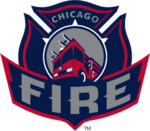
The official club colors are red and white. Over its history, the Fire have also employed navy blue, sky blue, and black as alternate colors.
The Chicago Fire logo is derived from the standard shape of a fire department's crest (also shown by the Chicago Fire Department), also known as a Florian's cross. This style was chosen by the original general manager, Peter Wilt, to establish a timeless image evocative of both classic American sports (as in the logos of the NHL Original Six) and the traditions of European soccer.
The logo features a stylized 'C' at its heart (representing Chicago), similar to the logos of the Bears and Cubs. The six points in a ring around the center allude to the stars in the Municipal Flag of Chicago, specifically the one commemorating the Great Chicago Fire of 1871.
Nike, the Fire's original equipment supplier, intended for the team to be named the Chicago Rhythm. The Rhythm identity featured a turquoise, black and green color scheme, and a logo adorned with a cobra. Team officials ignored Nike's work, and privately developed the Fire identity with the help of Adrenalin, Inc., a well-known sports-specific branding agency.[46][47]
The original Fire shirts were chosen because of their resemblance to a Chicago fireman's coat, featuring broad horizontal stripes across the torso and sleeves. In the first year, the home jersey was red and white with a silver "FIRE" on the stripe; while the away shirts were white and black in the same style. The jersey has remained remarkably constant ever since, continually maintaining the same format of an all-red shirt with a white horizontal chest stripe, even through changes in equipment sponsor (from Nike, to Puma, and currently adidas), until 2012 when the white stripe was exchanged for a blue stripe. Conversely, the Fire's secondary shirts have changed much over the years from white with black, to white with navy, to white with red, to all-white style and the all-blue currently used. Third shirts have often been yellow (originally to honor the Chicago Sting, later for the expired partnership with Morelia). A popular light blue third shirt was worn in 2005, based on the Municipal Flag of Chicago but was discontinued during the sponsorship change to Adidas the next year.
The club and their fans make frequent use of the symbols of Chicago, as a show of civic pride. Most prominent are the six-pointed Chicago stars, but the light blue color associated with the city, the municipal device, and the city skyline appear regularly on materials produced by the club and its fans. The municipal flag of Chicago is also favored by fans and often seen at the stadium, in a manner akin to the use of the flag of Catalonia by FC Barcelona fans but without a nationalist subtext.
Uniform history
|
1998
|
2008–2009
|
2012–2013
|
2014–2015
|
Sponsorship
| Seasons | Kit manufacturer | Shirt sponsor |
|---|---|---|
| 1998–2002 | Nike | None |
| 2003–2005 | Puma | |
| 2006–2007 | Adidas | |
| 2008–2010 | Best Buy | |
| 2011 | None | |
| 2012–2015 | Quaker | |
| 2016–present[48] | Valspar |
Stadium

Chicago plays its home games at Toyota Park, a soccer-specific stadium located at 71st Street and Harlem Avenue in the Chicago suburb of Bridgeview, Illinois, about 12 miles southwest from downtown Chicago. The stadium opened on June 11, 2006 and was developed at a cost of around $100 million. The Village of Bridgeview owns and operates Toyota Park.
Toyota Park will be renamed SeatGeek Stadium after the end of the 2018 season, with an estimated price between 2.5 million to 4 million per year.[49]
For its first years in the league the Fire played at Soldier Field, the 61,500-capacity home of the Chicago Bears of the NFL and one of the main venues of the 1994 FIFA World Cup. While that stadium was undergoing a $632 million renovation, the Fire played at Cardinal Stadium in Naperville, Illinois, on the outskirts of the Chicago metropolitan area. They returned to Soldier Field toward the end of 2003, remaining there through the end of 2005.
Home stadiums
- Soldier Field; Chicago (1998–2001), (2003–2005)
- Cardinal Stadium; Naperville, Illinois (2002–2003)
- Toyota Park; Bridgeview, Illinois (2006–present)
Other stadiums
- Benedetti–Wehrli Stadium; Naperville, Illinois (2004) 1 game in U.S. Open Cup
- Forest View Park; Arlington Heights, Illinois (2000) 1 game in U.S. Open Cup
- Milwaukee Sports Complex; Franklin, Wisconsin (2001) 1 game in U.S. Open Cup
- McCully Field; Wheaton, Illinois (2001) 1 game in U.S. Open Cup
- Shea Stadium, Peoria, Illinois (2008, 2011) 2 games in U.S. Open Cup Qualifying
Club culture
Supporters

There is a noteworthy fan culture for the Fire, existing from the date the club was founded, and building on an enthusiasm throughout Chicago sports. At matches, supporters and ultras groups occupy a standing area directly behind the north goal, in the Harlem End of Toyota Park.[50] This area is referred to as Section 8, originating from the numbering of the corresponding section at Soldier Field and the American military designation of mentally unfit soldiers.[51] Section 8 Chicago, the Independent Supporters' Association (ISA) for the Fire, oversees the activities of these numerous groups.[52] While incorporating a worldwide variety of styles with a Chicago bent, groups as part of Section 8 generally fall under the ultras designation. Additionally, an associated spinoff group called "Sector Latino" congregates in the corner-kick Section 101 at the stadium's southwest end.[53] There are also several other affiliated ultras and supporters groups, including The Arsonists, Banter Buddies, Blitzer Mob, Husaria, Fire Ultras 98, Partisans, Red Scare, Second City North, The Western Front, Ultras Red-Side, and Whiskey Brothers Aught-Five.[54] The Section 8 Chicago ISA is a registered 501(c)7 non-profit organization run by volunteers through an elected board of directors.[55]
Match atmosphere is known for organized displays of stadium-wide support, particularly for matches of prime competitive importance. Call-and-response cheering amongst the crowd is commonplace.[56] Fans at Toyota Park for Fire matches periodically choreograph tifo presentations both to show their pride and inspire the players on the field.[57] Toyota Park remains one of the few American environments to conduct such fan-driven presentations on a large scale.
Mascot
Their official mascot is Sparky, an anthropomorphic Dalmatian dog. Sparky is usually shown wearing the club's jersey but also arrives wearing firefighter attire.[58]
Rivalries
While the Fire have heated rivalries with a number of different MLS teams, Fire supporters of different ages will likely give different responses as to who the club's main rival is. The earliest Fire supporters would list Brimstone Cup rival FC Dallas as the Fire's nemesis, or Los Angeles Galaxy following heated playoff and cup matches with Dallas and L.A. in the league's early years.
After the Fire moved to the Eastern Conference, meetings with Dallas and LA became less frequent. Rivalries with D.C. United and New England Revolution were stoked following several thrilling playoff meetings. The Fire and Revolution are MLS' most frequent playoff matchup, meeting in the MLS Cup Playoffs 8 different times in 10 seasons from 2000 to 2009, splitting those encounters 4–4, with the Fire winning in 2000, 2003, 2008, and 2009. New England ended the Fire's playoff runs in 2002, 2005, 2006, and 2007. Newer rivals include Columbus Crew, who are the closest MLS team geographically to the Fire, and New York Red Bulls following the departure of former Fire head coach Juan Carlos Osorio to New York in 2007.
Broadcasting
In 2015, the Chicago Fire and NBC Sports Chicago (then Comcast SportsNet Chicago) agreed to a three-year deal, which includes 21 regular season and postseason matches for 2015.[59] Fire matches were televised locally on NBC Sports Chicago. Dan Kelly and former Fire coach Frank Klopas provided play-by-play and color commentary, respectively.[60] Matches were previously televised by NBC Chicago Nonstop and WPWR-TV.[61]
In 2016, the Chicago Fire and Tribune Broadcasting agreed to a three-year deal, which will see all regular season and postseason matches broadcast on WGN Radio and their internet-only sister station WGN Plus starting in the 2017 MLS season.
On March 9, 2018, the Chicago Fire announced that ESPN had acquired the regional television rights to the team through 2020, and that their regionally-televised matches will stream exclusively on ESPN's upcoming subscription service ESPN+. The team's matches would be streamed online for free until the launch of ESPN+ on April 12, 2018. Behind Los Angeles FC, the Fire are the second MLS franchise to sell their regional television rights exclusively to an over-the-top content provider (with the former having signed with YouTube TV).[62] ESPN+ also holds the out-of-market streaming rights for regional MLS matches as part of its overall service.[63][64][65]
Players
Current roster
- As of August 10, 2018[66]
Out on loan
| No. | Position | Player | Nation |
|---|---|---|---|
| 17 | Forward | Diego Campos (on loan to Indy Eleven) | |
| 28 | Forward | Elliot Collier (on loan to Indy Eleven) |
Ring of Fire
The "Ring of Fire" was established in 2003 by Chicago Fire Soccer Club and the Chicago Fire Alumni Association as permanent tribute to honor those who have made the club proud and successful over its history.[67] Aside from the initial member Piotr Nowak, only "Ring of Fire" members can select new inductees, and no more than one can be selected any year. Names and numbers (if applicable) are prominently displayed inside Toyota Park.
There were no inductees in 2008, 2010, or 2011. In 2008, the members voted to honor two recently deceased fans (supporter leaders Dan Parry and Brandon Kitchens) but were overruled by the club chairman Andrew Hauptman.[68] Parry and Kitchens were later made members of the Wall of Honor, a special recognition for Fire fans. In addition to Parry and Kitchens, the late Fire fans Euan McLean and Al Hack have been inducted into the Wall of Honor as of 2011.[69] C.J. Brown was expected to be honored in 2011, but a new rule was established that inductees must have been away from the club for at least a calendar year.[70] Brown, at the time an assistant head coach at Real Salt Lake, was officially inducted at the halftime ceremony during the home game vs. Real Salt Lake in Toyota Park on May 9, 2012.[71][72]
On October 3, 2015, Ante Razov, the club's all-time leading scorer, became the eight individual to be inducted into the club's Ring of Fire Hall of Fame.[73] The ceremony took place on that day during the halftime of the regular season home match against New England Revolution.[74]








Staff
Head coaches
| Name | Nationality | Tenure |
|---|---|---|
| Bob Bradley | October 30, 1997 – October 5, 2002 | |
| Dave Sarachan | November 4, 2002 – June 20, 2007 | |
| Juan Carlos Osorio | July 1, 2007 – December 10, 2007 | |
| Denis Hamlett | January 11, 2008 – November 24, 2009 | |
| Carlos de los Cobos | January 1, 2010 – May 30, 2011 | |
| Frank Klopas | May 30, 2011 – October 30, 2013 | |
| Frank Yallop | October 31, 2013 – September 20, 2015 | |
| Brian Bliss (interim) | September 20, 2015 – November 24, 2015 | |
| Veljko Paunović | November 24, 2015 – |
Club presidents
| Name | Tenure |
|---|---|
| Robert Sanderman | 1997–2000 |
| Peter Wilt | 2001–2005 |
| John Guppy | 2005–2008 |
| Javier León (interim) | 2008 |
| Dave Greeley | 2008–2010 |
| Javier León (interim) | 2010 |
| Julian Posada | 2010–2012 |
| Nelson Rodríguez | 2018–present[75] |
Vice presidents
- Logan Pause (November 3, 2014 – January 11, 2017)[76]
General managers
| Name | Tenure |
|---|---|
| Peter Wilt | 1997–2005 |
| Nelson Rodriguez | 2015–present |
Chief Operating Officer
| Name | Tenure |
|---|---|
| John Urban | 2018–present [75] |
Technical directors
- Frank Klopas (2008–11)[77]
- Brian Bliss (December 6, 2013 – January 5, 2016)[78]
Directors of player personnel
- Mike Jeffries (2010–12)[79]
Assistant coaches
- Denis Hamlett (1998–07)
- Mike Jeffries (1998–00, 2008–09)
- Frank Klopas (2000)
- Daryl Shore (2000–09)
- Tom Soehn (2001–03)
- Craig Reynolds (2004–07)
- Chris Armas (2008–09)
- Alvaro Briones (2010)
- Larry Sunderland (2010–11)
- Mike Matkovich (2009–10, 2012 – November 4, 2013)
- Leo Percovich (2011 – November 4, 2013)
- Aron Hyde (2010– November 19, 2015)
- C. J. Brown (December 11, 2013 – December 1, 2014)[80]
- Clint Mathis (January 31, 2014 – September 20, 2015)[81]
- Marc Bircham (February 6, 2015 – September 20, 2015)[82]
- Marko Mitrović (November 24, 2015 – )
- Eric Gehrig (February 15, 2017 – )[83]
Team physicians
- Dr. Preston Wolin (1998–08)
- Dr. Gilberto Muñoz (1999–15)
- Dr. Jeffrey Mjaanes, M.D. (2015– )
- Dr. Joshua Blomgren, D.O. (2015– )
Honors
| Continental | |||
|---|---|---|---|
| Competitions | Titles | Seasons | |
| National | |||
| Competitions | Titles | Seasons | |
| MLS Cup | 1 | 1998 | |
| Supporters' Shield | 1 | 2003 | |
| Lamar Hunt U.S. Open Cup | 4 | 1998, 2000, 2003, 2006 | |
- Individual Club Awards
- MLS Team Fair Play Award: 2009
Record
Top goalscorers
- As of Jul 22, 2018[85]
| # | Name | Career | MLS | Playoffs | Open Cup | CCL | Total |
|---|---|---|---|---|---|---|---|
| 1 | 1998–2000 2001–2004 |
76 | 10 | 6 | 2 | 94 | |
| 2 | 2005–2009 2012–2014 |
48 | 4 | 3 | 0 | 55 | |
| 3 | 1998–2002 | 32 | 0 | 6 | 1 | 39 | |
| 4 | 2015–2017 | 33 | 0 | 5 | 0 | 38 | |
| 4 | 2017–present | 34 | 0 | 4 | 0 | 38 | |
| 6 | 1999–2002 | 22 | 5 | 3 | 5 | 35 | |
| 7 | 1998–2002 | 26 | 3 | 0 | 0 | 29 | |
| 8 | 2003–2004 | 22 | 1 | 4 | 1 | 28 | |
| 9 | 2013–2015 | 22 | 0 | 5 | 0 | 27 | |
| 10 | 2000-2002 | 17 | 4 | 3 | 0 | 24 |
Year-by-year
- As of November 10, 2017[86]
| Season | Regular Season | Season Record |
MLS Cup Playoffs | U.S. Open Cup | CONCACAF Champions League |
|---|---|---|---|---|---|
| 1998 | 2nd West, 3rd overall | 20–12–0 | Won MLS Cup (D.C. United 2–0) | Champions | Did not qualify |
| 1999 | 3rd West, 4th overall | 18–14–0 | Lost Conference Semi-finals (Dallas Burn 1–2) | Round of 16 | 3rd place |
| 2000 | 1st Central, 2nd overall | 17–9–6 | Lost MLS Cup (Kansas City Wizards 0–1) | Champions | Did not qualify |
| 2001 | 1st Central, 2nd overall | 16–6–5 | Lost Semi-finals (Los Angeles Galaxy 1–2) | Semi-finals | Not held |
| 2002 | 3rd East, 7th overall | 11–13–4 | Lost Conference Semi-finals (New England Revolution 1–2) | Round of 16 | Quarter-finals |
| 2003 | 1st East, 1st overall Won Supporters' Shield |
15–7–8 | Lost MLS Cup (San Jose Earthquakes 2–4) | Champions | Did not qualify |
| 2004 | 5th East, 10th overall | 8–13–9 | Did not qualify | Runners-up | Semi-finals |
| 2005 | 3rd East, 4th overall | 15–13–4 | Lost Conference Finals (New England Revolution 0–1) | Semi-finals | Did not qualify |
| 2006 | 3rd East, 4th overall | 13–11–8 | Lost Conference Semi-finals (New England Revolution 2–4) | Champions | |
| 2007 | 4th East, 7th overall | 10–10–10 | Lost Conference Finals (New England Revolution 0–1) | Round of 16 | |
| 2008 | 2nd East, 3rd overall | 13–10–7 | Lost Conference Finals (Columbus Crew 1–2) | Quarter-finals | |
| 2009 | 2nd East, 5th overall | 11–7–12 | Lost Conference Finals (Real Salt Lake 4–5) | Round of 16 | |
| 2010 | 4th East, 10th overall | 9–12–9 | Did not qualify | Round of 16 | |
| 2011 | 6th East, 11th overall | 9–9–16 | Runners-up | ||
| 2012 | 4th East, 6th overall | 17–11–6 | Lost Knockout Round (Houston Dynamo 1–2) | Round of 32 | |
| 2013 | 6th East, 12th overall | 14–13–7 | Did not qualify | Semi-finals | |
| 2014 | 9th East, 15th overall | 6–10–18 | Semi-finals | ||
| 2015 | 10th East, 20th overall | 8–20–6 | Semi-finals | ||
| 2016 | 10th East, 20th overall | 7–17–10 | Semi-finals | ||
| 2017 | 3rd East, 3rd overall | 16–11–7 | Lost Knockout Round (New York Red Bulls 0-4) | Round of 16 | Did not qualify |
Team awards
- As of January 18, 2018[87]
| Year | Team MVP | Golden Boot* | Defender of the Year | |
|---|---|---|---|---|
| Winner | Goals | |||
| 1998 | 10 | |||
| 1999 | 14 | |||
| 2000 | 18 | |||
| 2001 | 10 | |||
| 2002 | 14 | |||
| 2003 | 14 | |||
| 2004 | 11 | |||
| 2005 | 8 | |||
| 2006 | 9 | |||
| 2007 | 7 | |||
| 2008 | 9 | |||
| 2009 | 7 | |||
| 2010 | 7 | |||
| 2011 | 12 | |||
| 2012 | 8 | |||
| 2013 | 15 | |||
| 2014 | 8 | |||
| 2015 | 10 | |||
| 2016 | 9 | |||
| 2017 | 24 | |||
*Golden Boot is the team leader in goals (regular season games only).
Average attendance
- Regular season/Play-offs
- 1998: 17,887/22,677
- 1999: 16,016/8,197
- 2000: 13,387/8,431
- 2001: 16,388/11,239
- 2002: 12,922/9,434
- 2003: 14,005/14,961
- 2004: 17,153/missed playoffs
- 2005: 17,238/11,493
- 2006: 14,088/10,217
- 2007: 16,490/17,834
- 2008: 17,034/17,312
- 2009: 14,689/21,626
- 2010: 15,814/missed playoffs
- 2011: 14,553/missed playoffs
- 2012: 16,407/10,923
- 2013: 15,228[88]/missed playoffs
- 2014: 16,076/missed playoffs
- 2015: 16,003/missed playoffs
- 2016: 15,602/missed playoffs
- 2017: 17,383/11,647
Affiliations
- Tulsa Roughnecks FC – United Soccer League (2nd division)[89]
References
- ↑ "Chicago Fire Club History". chicago-fire.com.
- ↑ "Fire Fire Peter Wilt, Fans Protest". chicagoist.com. Archived from the original on October 17, 2007. Retrieved December 31, 2007.
- ↑ "Hauptman to Purchase Chicago Fire". Thesportsbizblog.blogspot.com. July 12, 2007. Retrieved December 3, 2011.
- ↑ "The owner that won't let go". soccerbyives.net.
- ↑ "Fire sack Hamlett". fifa.com.
- ↑ "Monday Kickaround". washingtonpost.com.
- ↑ "Fire, CLDC Part Ways".
- ↑ "FIRE NAMES FRANK KLOPAS HEAD COACH".
- ↑ "Fire reacquire forward Chris Rolfe".
- ↑ "Fire Announce 2012 Team Award Winners".
- ↑ "2012 Regular Season Standings".
- ↑ "2013 M.L.S. Preview: Eastern Conference".
- ↑ Bell, Jack; Das, Andrew (February 28, 2013). "2013 M.L.S. Preview: Eastern Conference". The New York Times.
- ↑ "Union trade Bakary Soumaré to Chicago Fire". May 23, 2013. Retrieved May 23, 2013.
- ↑ McCarthy, Jack (May 25, 2013). "Magee trade for Rogers confirmed, expected to join Fire Monday". Chicago Tribune.
- ↑ "Chicago Fire Defender Arne Friedrich Announces Retirement". chicago-fire.com. June 23, 2013. Retrieved June 23, 2013.
- ↑ "Chicago Fire coach Frank Klopas raves about new DP Arevalo Rios: "This guy's a world-class player"". MLSsoccer.com. Retrieved June 30, 2015.
- ↑ "EDITORIAL: What it means to be a part of the Fire family". Chicago-Fire.com. Archived from the original on July 4, 2014. Retrieved November 30, 2014.
- ↑ "Chicago Fire Soccer Club President of Soccer Operations Javier Leon and Head Coach Frank Klopas To Step Down". chicago-fire.com. October 30, 2013.
- ↑ "Chicago Fire Names Frank Yallop as New Head Coach and Director of Soccer". chicago-fire.com. October 31, 2013.
- ↑ "Marco Di Vaio, Robbie Keane & Mike Magee vie for Volkswagen MVP as MLS reveals award finalists". mlssoccer.com. November 20, 2013.
- ↑ "Chicago Fire forward Mike Magee voted 2013 Volkswagen MLS Most Valuable Player". mlssoccer.com. December 5, 2013.
- ↑ "RELEASE: Chicago Fire Forward Mike Magee Wins 2013 Volkswagen MLS Most Valuable Player Award". chicago-fire.com. December 5, 2013.
- ↑ "Chicago Fire name longtime Columbus Crew fixture Brian Bliss as new technical director". MLSsoccer.com. December 6, 2013.
- ↑ "Chicago Fire Soccer Club Adds Clint Mathis to Coaching Staff". Chicago-Fire.com. January 31, 2014.
- ↑ "RELEASE: Chicago Fire Soccer Club Names C.J. Brown Assistant Coach". chicago-fire.com. December 11, 2013.
- ↑ "Brian McBride rejoins Fire—as an assistant". Chicago Tribune. May 28, 2014.
- ↑ "Chicago Fire trade Chris Rolfe to D.C. United for allocation money". MLSsoccer.com. April 2, 2014.
- ↑ "Chicago Fire deal ironman defender, 2012 Rookie of the Year Austin Berry to Philadelphia Union". February 24, 2014.
- ↑ "Fire head coach Frank Yallop apologizes to supporters for Open Cup semifinal defeat". Chicago-Fire.com. August 14, 2015.
- ↑ "Report: Chicago Fire set to transfer midfielder Shaun Maloney to Hull City". MLSsoccer.com. August 20, 2015.
- ↑ "#HauptmanOut: Fire fans protest against ownership". hottimeinoldtown.com. July 7, 2015.
- ↑ "Chicago Fire soccer fans in the mud pit of hell". chicagotribune.com. September 30, 2015.
- ↑ "Chicago Fire Soccer Club Names Former MLS Executive Nelson Rodríguez General Manager". Chicago Fire. Archived from the original on October 17, 2015. Retrieved October 5, 2015.
- ↑ "Bliss: Fire Should Hold Heads High Despite Season-Ending Loss to Red Bulls". chicago-fire.com. October 25, 2015.
- ↑ "Chicago Fire Soccer Club Announce Soccer Staff Changes". Chicago-Fire.com. November 18, 2015.
- ↑ "Chicago Fire Soccer Club Hires Veljko Paunovic as Head Coach". Chicago Fire Communications. November 24, 2015.
- ↑ "Sporting KC Names Brian Bliss Director of Player Personnel". Sporting KC Communications. January 5, 2016.
- ↑ Stone, Simon (March 21, 2017). "Bastian Schweinsteiger: Manchester United allow midfielder to join Chicago Fire". BBC Sport. Retrieved March 21, 2017.
- ↑ "Bastian Schweinsteiger says he is 'sad' to leave Manchester United for Chicago Fire". Sky Sports. March 21, 2017. Retrieved March 21, 2017.
- ↑ Marshall, Adam (March 21, 2017). "SCHWEINSTEIGER TO JOIN CHICAGO FIRE". manutd.com. Retrieved March 21, 2017.
- ↑ "Chicago Fire Soccer Club Acquires World Champion Bastian Schweinsteiger as Designated Player". chicago-fire.com. March 21, 2017. Retrieved March 21, 2017.
- ↑ Stejskal, Sam (March 22, 2017). "How the Chicago Fire embraced past futility to land Bastian Schweinsteiger". mlssoccer.com. Retrieved March 22, 2017.
- ↑ Marshall, Adam (March 29, 2017). "SCHWEINSTEIGER SEALS CHICAGO FIRE MOVE". Retrieved March 29, 2017.
- ↑ Bannon, Tim (July 11, 2018). "Chicago billionaire Joe Mansueto buys 49 percent stake in Fire". Chicago Tribune. Retrieved July 11, 2018.
- ↑ DeSimone, Bonnie. "Name Game Ends: It's Fire," Chicago Tribune, Thursday, October 9, 1997.
- ↑ "Chicago Fire". Adrenalin, Inc. Retrieved June 30, 2015.
- ↑ "Chicago Fire sign Valspar as new jersey sponsor". chicagobusiness.com. October 14, 2015.
- ↑ "Indebted Chicago Suburb Catches a Break With Naming Rights Deal". Bloomberg.com. April 19, 2018. Retrieved April 25, 2018.
- ↑ Crandall, Jeff. "Stand Sing Participate". Chicago Fire. Retrieved December 18, 2016.
- ↑ Parker, Graham (March 18, 2015). "'We're anarcho-syndicalists': an interview with Chicago Fire's Section 8". The Guardian. Guardian News and Media Limited. Retrieved December 11, 2016.
- ↑ "Mission Statement Section 8 Chicago". Section 8 Chicago. Archived from the original on December 20, 2016. Retrieved December 11, 2016.
- ↑ "Sector Latino". Retrieved December 18, 2016.
- ↑ "Supporters Groups". Retrieved March 5, 2018.
- ↑ "About Section 8 Chicago". Section 8 Chicago. Retrieved December 11, 2016.
- ↑ "Songs and Chants". Chicago Fire. Retrieved December 18, 2016.
- ↑ Crandall, Jeff (August 8, 2010). "The Tifo Display". Chicago Fire. Retrieved December 18, 2016.
- ↑ "Sparky". Retrieved January 16, 2012.
- ↑ "Chicago Fire and Comcast SportsNet Chicago agree to multi-year broadcasting deal". Chicago Fire. January 26, 2015. Retrieved December 11, 2016.
- ↑ "Chicago Fire and Comcast SportsNet Chicago Announce Regional Broadcast Plans" (Press release). Chicago, Illinois: Chicago Fire. February 23, 2016. Retrieved December 18, 2016.
- ↑ Ecker, Danny (January 26, 2015). "Chicago Fire games moving back to CSN Chicago". Crain's Chicago Business. Retrieved December 12, 2016.
- ↑ Pimiento, Juan. "Chicago Fire sign exclusive TV deal with ESPN+ streaming service". Chicago Tribune. Retrieved March 10, 2018.
- ↑ "How to watch out-of-market MLS matches in 2018". MLSSoccer.com. Retrieved March 4, 2018.
- ↑ "ESPN's Web Service Gains Exclusive Pro Soccer Rights". Bloomberg.com. February 13, 2018. Retrieved February 13, 2018.
- ↑ "FAQs: Chicago Fire on ESPN+". Chicago Fire. March 9, 2018. Retrieved March 9, 2018.
- ↑ http://www.chicago-fire.com/players
- ↑ "Ring of Fire". Chicago Fire. Retrieved October 5, 2015.
- ↑ Archived June 7, 2008, at the Wayback Machine.
- ↑ "Wall of Honor". Chicago Fire SC. Retrieved September 30, 2012.
- ↑ Guillermo Rivera (June 6, 2011). "CJ Brown Will Have To Wait | Chicago Fire Confidential". Chicagonow.com. Retrieved December 3, 2011.
- ↑ "Brown returns to Chicago for "Ring of Fire" induction". chicago-fire.com. May 9, 2012.
- ↑ "CJ Brown: Fire Legend, Ring of Fire Inductee". May 10, 2012.
- ↑ "Ring of Fire". chicago-fire.com.
- ↑ "Chicago Fire Host New England Revolution on Special Evening at Toyota Park". chicago-fire.com.
- 1 2 "Chicago Fire Soccer Club Announces Executive Leadership Moves".
- ↑ "The Legend Continues: Logan Pause named Vice President of Chicago Fire Soccer Club". chicago-fire.com. November 3, 2014.
- ↑ "Fire Names Frank Klopas Head Coach". Chicago Fire. November 3, 2011. Retrieved December 11, 2016.
- ↑ "RELEASE: Chicago Fire appoints Brian Bliss Technical Director". chicago-fire.com. December 6, 2013.
- ↑ "Technical Staff". Chicago Fire. Retrieved May 25, 2013.
- ↑ "New York City FC Adds CJ Brown to Coaching Staff". nycfc.com. December 1, 2014.
- ↑ "Chicago Fire Soccer Club Adds Clint Mathis to Coaching Staff". chicago-fire.com. January 31, 2014.
- ↑ "Chicago Fire Announce Two Additions to Technical Staff". Chicago Fire. Retrieved June 30, 2015.
- ↑ "Retired Chicago Fire defender Eric Gehrig hired by club as assistant coach". mlssoccer.com. February 15, 2017.
- ↑ https://www.mlssoccer.com/history/trophies/trophies-by-mls-club
- ↑ "Stats". Chicago Fire. Retrieved June 6, 2018. }
- ↑ http://www.mlssoccer.com/standings
- ↑ "Archived copy". Archived from the original on May 3, 2012. Retrieved October 27, 2011.
- ↑ "2013 MLS Standings and Leaders" (PDF). MLS Soccer. Archived from the original (PDF) on October 30, 2013. Retrieved October 31, 2013. page 4
- ↑ "Chicago Fire announce affiliation with USL's Tulsa Roughnecks FC". Major League Soccer. Retrieved February 20, 2017.
External links

- Official website

